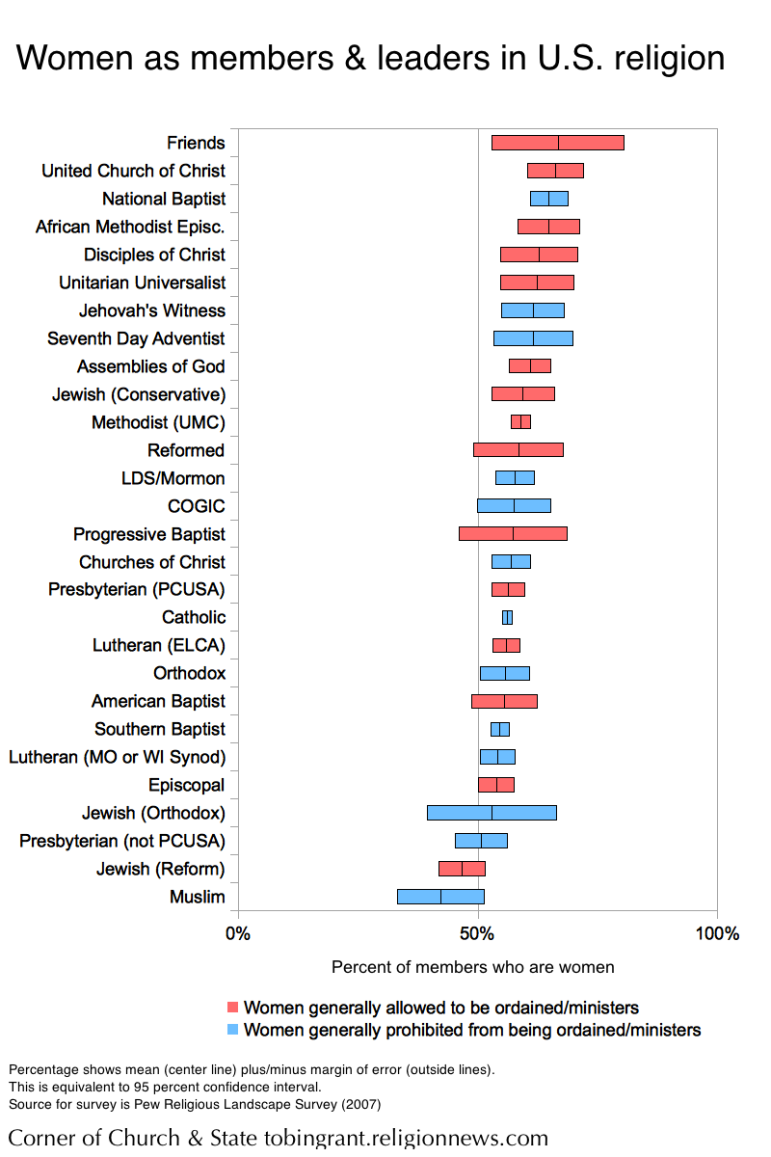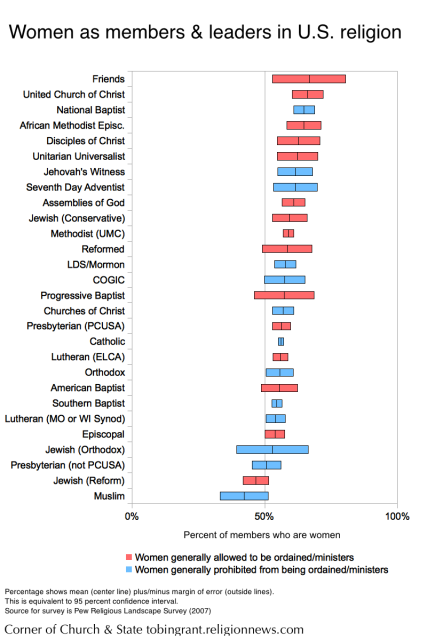This week, the Seventh-Day Adventists voted to continue their prohibition against women being ordained. The vote was for a middle-ground, allowing regional bodies to decide for themselves about ordination. The Seventh-Day Adventists are just one of the many religious bodies who are grappling with the question of women in ministry.
Women, on average, are more religious than men. Yet, two-thirds of religious Americans belong to a community that won’t consider women for leadership positions.
In the graph, I chart out the percent female for American churches, denominations, and religions. Nearly all of them are majority female. The ones that are not are, statistically, evenly split. No group (unless we include atheists, agnostics, and other “nones”) is majority male.
I divide the groups based on whether they generally ordain women as leaders (see note on this below). About half the groups ordain women. Friends (Quakers), Assemblies of God, Methodists, and Disciples of Christ have long had women in leadership. Others began ordaining women in latter half of the 20th Century.
While there are many denominations that ordain women, these denominations include only about a third of religious Americans. Catholics, Southern Baptists (and other baptist associations), most historically black denominations, most evangelical churches, Mormons, Jehovah’s Witnesses, Orthodox Jews, and Muslims do not ordain women.
Note on classifying churches and religious groups on ordination of women
It’s tricky (if not dangerous) to discuss topics such as ordination across religious traditions. Each religious group has its own understanding of leadership, clergy, and ordination. I loosely refer to this as “ordination”, even though some churches refuse to use the term. So, my use of “ordination” is shorthand for a general pattern of allowing women to serve in top leadership roles.
Other caveats:
- I am relying on general policy positions by groups, not actual practice. Some groups that allow women to be clergy still have relatively few women as pastors or ministers.
- Some denominational bodies do not dictate to member congregations qualifications for clergy. But I put them in the “does not generally ordain” category if these member churches rarely if ever have women as leaders. Examples include National Baptists and Churches of Christ.
- Similarly, Southern Baptist Convention adopted a resolution to prohibit women for serving as pastors or deacons. However, as with all resolutions in the SBC, it is not binding on local congregations.
- Some groups have “ordain” women, but do not allow them to be in leadership over congregations. Jehovah’s Witnesses ordain all members of the church and do not distinguish between clergy and laity. That said, they have elders who lead congregations; these elders are men.
- Some groups never have ordained leaders. Friends (Quakers) do not “ordain” ministers; they “record” ministers. A person who is doing ministry is recognized or recorded as being a minister. A minister is viewed as being equal in status to lay persons.
- Ordination in some groups is used any time a person is given a position in the church. Some groups may ordain women in some capacities (e.g., as deacons/deaconesses, teachers, or missionaries) while excluding them from higher authoritative positions.
Don’t miss any more posts from the Corner of Church & State. Click the red subscribe button in the right hand column. Follow @TobinGrant on Twitter and on the Corner of Church & State Facebook page.






